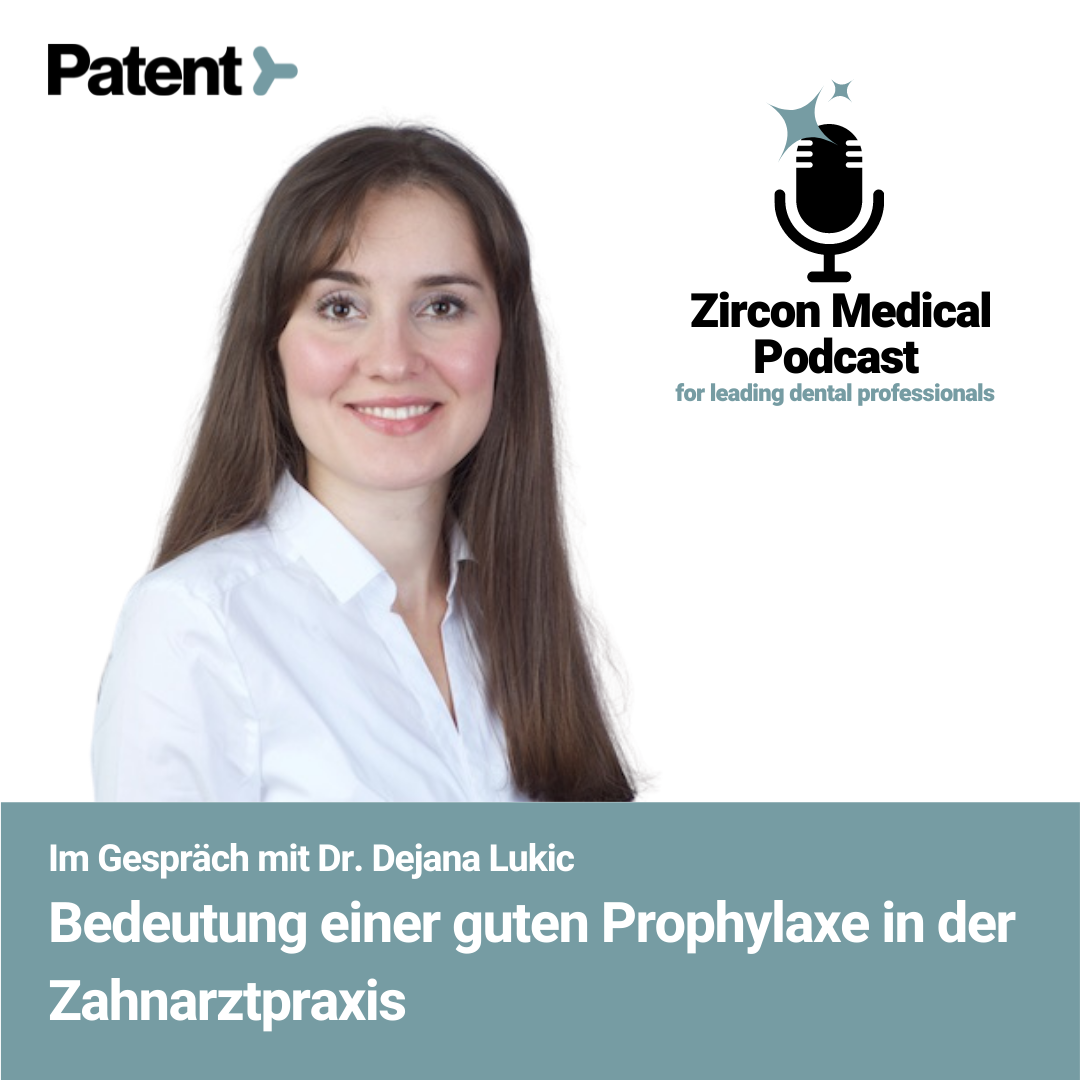
Introducing Dr. Dejana Lukic, a general dentist specializing in prophylaxis
The difference between dentistry in Sweden and Switzerland
Prophylactic work can also be profitable
Education is the most effective means of motivating patients
An online platform that promotes dental awareness and consultations
Dr. Lukic’s personal prophylaxis routine
Dr. Dejana Lukic
General Dentist Specializing in Prophylaxis
Completed her dental studies at the University of Zurich in 2016
Worked as a dentist in Sweden from 2018 to 2021
Experienced inendodontology, periodontology, oral surgery, and pediatric dentistry
Completed her Ph.D. at the University of Zurich in 2020
Published an article on endodontics in the Journalof „Microorganisms“
Crowdify: https://www.crowdify.net/de/projekt/dein-online-zahnarzt
Instagram: https://www.instagram.com/dently.ch/
Email: info@dently.ch
In Conversation with Dr. Dejana Lukic
Prophylaxis is perhaps one of the most important dental services for patients. The value of prophylactic care cannot be underestimated because it determines the patient’s overall oral health and the success of other dental treatments, such as periodontal therapy and implant placements. However, it’s easy to lose sight of the importance of prophylaxis in dental practices. The Zircon Medical Podcast recently hosted Dr. Dejana Lukic, a general dentist specializing in prophylaxis, to discuss the importance of good prophylaxis in a dental practice.
Introducing Dr. Dejana Lukic, a general dentist specializing in prophylaxis
Dr. Dejana Lukic is a general dentist specializing in prophylaxis. She completed her dental studies at the University of Zurich in 2016, following which she completed her Ph.D. at the University of Zurich in 2020. She recently published an article on endodontics in the Journal of „Microorganisms“ and she has worked as a dentist in Sweden from 2018 to 2021. While working in Sweden, she focused primarily on endodontology, periodontology, oral surgery, and pediatric dentistry.
Over the years, Dr. Lukic has observed how prophylaxis is often sidelined in dental practices in favor of more complex reconstructions. She has also noted that patients often lack the tools, information, and education to manage their oral health optimally. Her observations have driven her to create an innovative app-based platform that promotes dental education amongst patients while serving as an arena for online consultations.
As a teenager, Dr. Lukic says she was most interested in art and the natural sciences. She wanted to work with people and have a positive impact on their lives. She believes dentistry is an art form, which she calls the “art of healing.” Dentistry gives her the opportunity to make beautiful things, work with colors, and positively influence patients’ lives. And so, she has effectively combined her love of art and natural sciences into the perfect profession.
The difference between dentistry in Sweden and Switzerland
Dr. Lukic completed her dental education in Zurich, but she has spent most of her time as a dentist working in Sweden. She says Sweden is more like Austria, especially in terms of billing and insurance. In Switzerland, patients pay for most of their dental treatments completely out of pocket, whereas patients in Sweden pay for dental treatments through insurance companies. That’s the biggest difference in dentistry between the two countries.
Besides systemic concerns, Dr. Lukic also emphasizes that different countries use different methodologies. Because of her diverse experience, she has learned that the field of dentistry can’t be seen in absolute terms. Dentists in different countries often use different methods and techniques but achieve the same results. This has broadened her thinking, allowing her to see more flexibility in her field.
Dr. Lukic also notes that prophylaxis is undervalued in most places. She says colleagues often lose sight of the importance of prophylaxis and delegate it to dental hygienists and prophylaxis assistants. She believes dentists across the board must start focusing more on prophylactic care for their patients.
Prophylactic work can also be profitable
Dentists often delegate prophylactic work because of economic concerns. Prophylaxis takes time and resources, requires less skill than complex reconstructions, and isn’t as directly profitable as other procedures. Because of these factors, dentists generally delegate prophylactic work to their dental hygienists and prophylaxis assistants, so they can focus on more complex procedures. Dr. Lukic agrees that time and resources need to be managed, but she believes dentists should move away from an either-or mentality.
Prophylactic work might not be directly profitable compared to complex reconstructions. But focusing on prophylaxis can be beneficial in the long run. Prophylaxis isn’t a luxury, and dentists must focus on it because it’s their job. But good prophylaxis can also improve the dental practice’s bottom line in the long run. Patients with good oral hygiene experience less bleeding and complications during reconstruction and other dental procedures, which leads to better results and more satisfied patients.
And when patients are more satisfied, they are likely to return to the dental practice and perhaps even bring new patients. Focusing on prophylaxis can improve the outcomes of other dental procedures, leading to more satisfied and loyal patients.
Education is the most effective means of motivating patients
Dentists can’t follow patients into their homes and force them to follow optimal oral hygiene standards. They also can’t force patients to come for regular check-ups when they don’t experience toothaches or other dental problems. The only way to encourage patients to maintain optimal oral hygiene at home and visit the dentist regularly is through education.
Most dental problems are asymptomatic at the initial stages. Patients with early gum disease and caries might not realize they need dental procedures, so they don’t visit dentists. But these conditions continue worsening in the background until it’s finally too late. The only way dentists can ensure their patients reach out even when everything is okay is through good education. Dentists must explain the necessity of regular check-ups and proactive treatments.
An online platform that promotes dental awareness and consultations
Dr. Lukic believes technological capabilities can be harnessed to promote dental awareness, education, and consultations. She is currently working on an online platform that gives patients access to more information about certain dental problems and illnesses. Instead of consulting dentists for the smallest of problems, patients can use this platform to educate themselves and talk directly with a specialist. The online platform would empower patients to contact dental specialists from the comfort of their homes at any time or day.
Dr. Lukic is currently crowdfunding for this project , and she welcomes all potential partners and investors to check out the project details at https://www.crowdify.net/de/projekt/dein-online-zahnarzt
Dr. Lukic’s personal prophylaxis routine
Dr. Lukic says she didn’t have great oral hygiene as a teenager. But as she became a dentist, she learned a lot about prophylaxis in her studies, which she implemented in her daily routine. She currently uses an electric toothbrush, and she cleans the interdental spaces thrice a day using dental floss or toothbrushes. She also encourages receiving fluoride through a mouth rinse. However, besides oral hygiene, she says the patient’s diet is also important.
Dr. Lukic says an individual’s dietary habits, including their sugar consumption and whether they smoke, affect their oral health.











